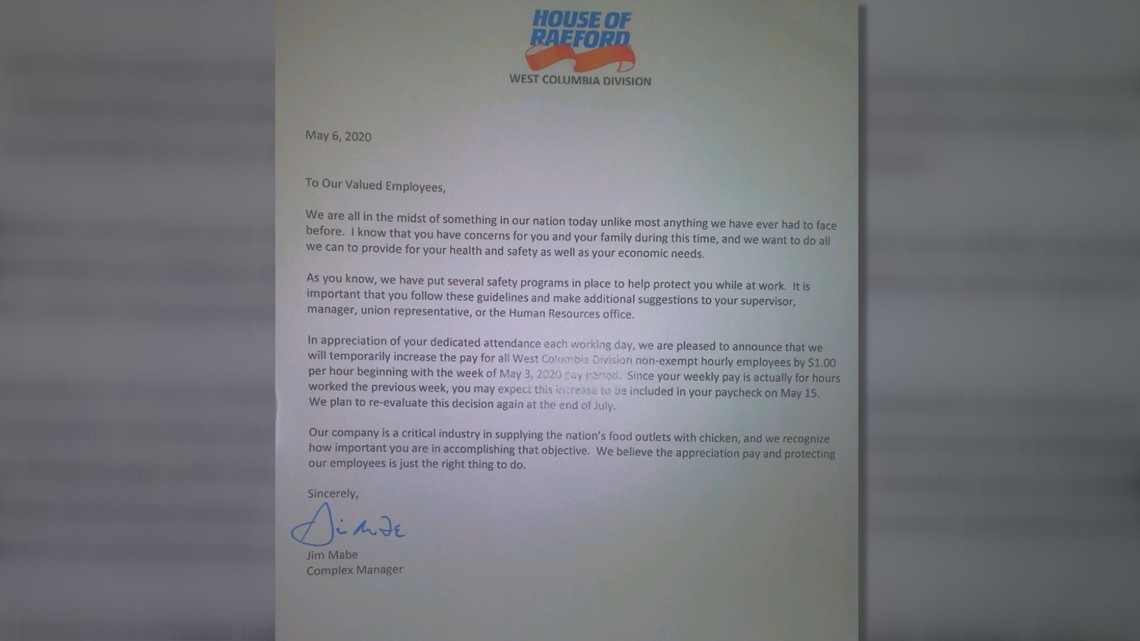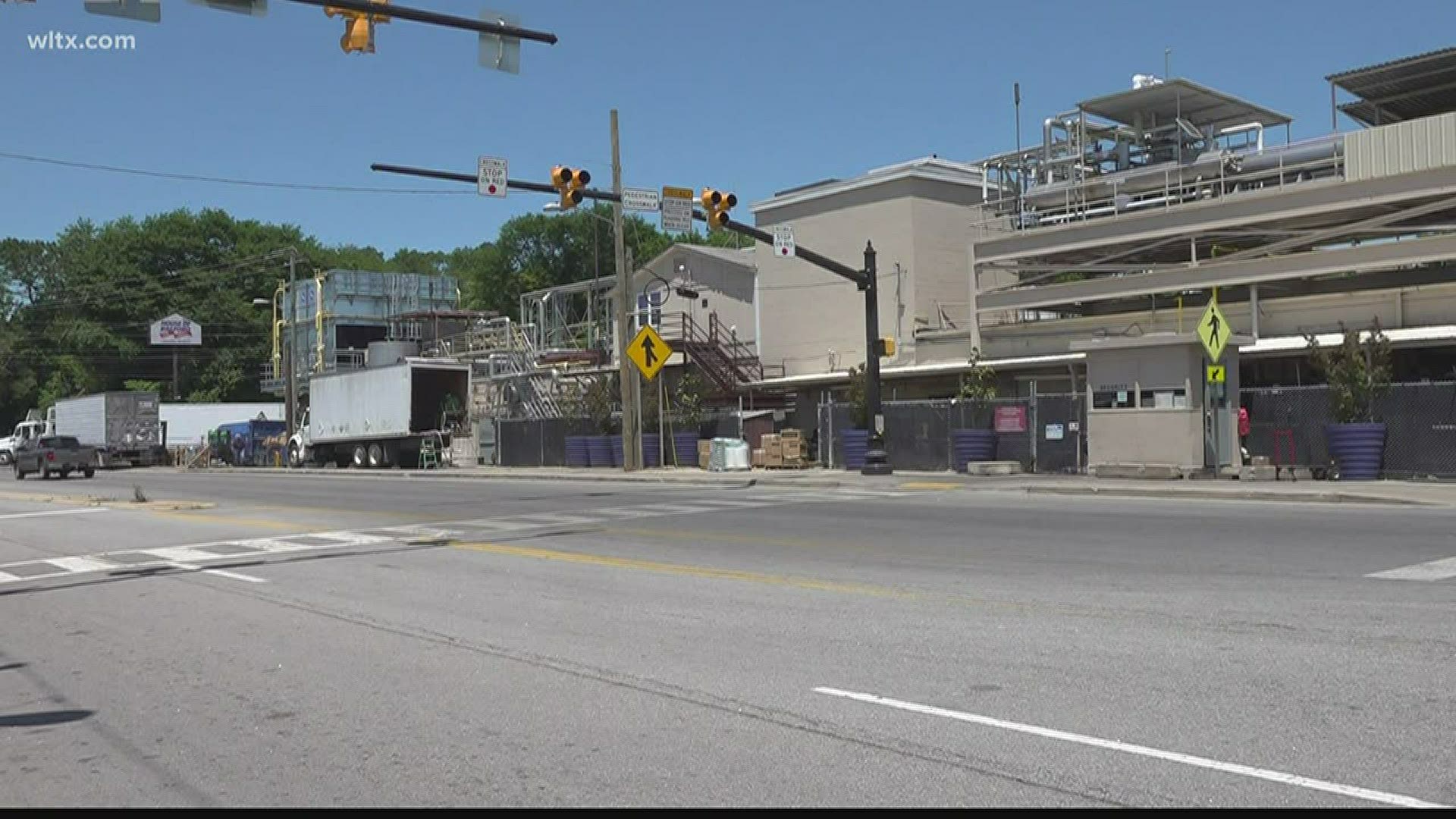WEST COLUMBIA, S.C. — About 20 workers at the House of Raeford chicken processing plant in West Columbia walked off of their jobs Wednesday afternoon in protest of working conditions inside the plant.
Protesters claimed there is a lack of social distancing on the processing line and said they were being mistreated and wanted hazard pay during the coronavirus crisis.
"This is a safety hazard. We're around each other inside this plant and we're not six feet away," said protester Anthony Furman. "We're one foot away. We're too close every day, all day."
Those who left the job told reporters with WLTX that if they walk off, they are considered fired by management.
"Everybody else around here is getting hazard pay. Their jobs are looking out for them," said protester Naesha Shelton. "[House of Raeford is] treating us like slaves. That's how we feel. We're being treated like slaves."
"We should feel appreciated seeing as how we're essential workers," said protester Trey Jeffcoat. "If we're so essential, we need to feel essential and we need to feel appreciated."
Around mid-afternoon, some plant workers showed WLTX a letter to them from the company that said hourly, non-exempt employees would get a temporary $1 an hour pay raise.


In an email statement to WLTX, Dave Witter, House of Raeford Manager of Corporate Communications and Sustainability, said the following:
Our greatest concern is to provide protection for our associates and growers. House of Raeford has implemented COVID-19 protocol at all its locations, including our W. Columbia operation, following CDC guidelines. These guidelines include but are not limited to:
- Posting of educational materials, both printed and on our break room monitors.
- Reinforcing the importance of handwashing and sanitizing hands.
- Increased cleaning and sanitizing of all commonly used surfaces.
- Emphasizing the need to socially distance as much as possible in public areas like break rooms and parking lots.
In addition, W. Columbia has increased the Personal Protective Equipment issued to employees to include facemasks and face shields. Face shields are important for all employees that are unable to socially distance at their work stations. We have also installed permanent plastic barriers between work stations on our production lines where employees are facing each other. All locations also conduct temperature checks as employees arrive for work. Company safety and health personnel received training from outside healthcare professionals on how to identify employees with symptoms of COVID-19. Employees have been notified to inform their supervisor if they feel sick (fever, chills, difficulty breathing) and report to the first aid station. Those who are sick are sent home with a recommendation to see their healthcare provider.
Due to the nature of most of our jobs, employees must be on-site. Therefore, continued monitoring of the situation is critical so that we integrate necessary changes in a timely manner.
Protestors told News 19 the plastic partitions in the processing line were put into place over the weekend. The new face shields, face masks and temperature checks, they say, were given out to employees Tuesday.
Witter says part of the reason supplies were distributed Tuesday is because some of the items didn't arrive until this week.
With employees concerned about work conditions, we reached out to several lawmakers in the West Columbia and Lexington community for comment.
West Columbia Mayor Tem Miles tells News 19, "I'm happy to see folks expressing their first amendment rights. Columbia Farms has been a good corporate citizen in West Columbia. They provide an essential service by keeping our food chain in tact. I'm certain if there are any legitimate issues to be addressed, Columbia Farms will be on top of it."
David Moye, West Columbia Councilman for District 8, said in a statement: "The strength of West Columbia's workforce is an asset that makes our city competitive. Maintaining quality working conditions goes hand-in-hand with West Columbia's progress goal to attract the best talent pool and businesses to our city."
Moye also said on the phone he believes if folks have legitimate concerns, they should be checked out.
Federal safety regulators at OSHA as well as the Centers for Disease Control issued interim guidelines late last month to protect employees from the coronavirus in meat packing and processing plants.
According to documents from the agency's website the new guidelines given on April 26 recommend actions employers can take to reduce the risk of employee exposure to the coronavirus. OSHA officials said the coronavirus affected many meat and poultry processing workers in plants in several states.
Agency leaders said the meat products these workers handle do not expose them to the coronavirus but close contact with co-workers and supervisors may contribute to virus exposure.
These interim guidelines include information on cleaning of shared meat packing and processing tools, screening employees for the virus before they enter work facilities, managing workers who show symptoms of coronavirus, and the use of appropriate personal protective equipment and practice social distancing at work.
Last week, President Donald Trump signed an executive order ordering meat processing plant to stay open. It also applies to plants that have already closed, which will have to re-open with healthy workers.
The order declared meat processing plants critical infrastructure to protect against disruptions to the food supply. Union leaders argue that the order will jeopardize the lives of workers.
As of last Friday, more than 4,000 workers at 115 meatpacking plants across the U.S. have been infected with the coronavirus, and 20 of those workers have died. The Smithfield plant in Sioux Falls, South Dakota has had more than 800 cases among its workers. The facility was closed for two weeks.
RELATED: Smithfield closes South Dakota plant after nearly 300 workers test positive for coronavirus
On Monday, employees at the Sioux Falls plant began returning to work. The company has been testing workers and their families for the virus.
That's just one of at least 20 plants that have halted production because of the virus. They include Tyson Food's biggest pork plant, located in Iowa. The facility closed in April after an outbreak. Health officials say that hundreds of employees at the facility were infected with the virus.
The facility is reopening this week, and the company says all employees are being tested before returning to work
Industry officials say that U.S. beef and pork processing capacity is down 40% from last year.
Raeford Farms History:
The “chicken plant” as everyone knows the business by, opened on Sunset Blvd in West Columbia over 50 years ago. The property along the Congaree River, two blocks from the iconic Gervais Street Bridge, has seen a lot of nearby development with luxury apartments being built a stone’s throw away from the processing plant.
According to Lexington County records, North Carolina-based House of Raeford purchased the plant from Columbia Poultry Farms in 1998 for just over $1.51 million. House of Raeford also owns chicken processing plants in Leesville, Hemingway and Greenville, as well as in North Carolina, Georgia and Louisiana
As of 2017, House of Raeford employed over 800 people in West Columbia, making it one of the largest employers in Lexington County.
The West Columbia site processes approximately 280 million pounds of live chickens per year for grocery stores and supermarkets.
According to the House of Raeford website, the company tries to maintain an open door communications environment and a culture of safety for its workers.

